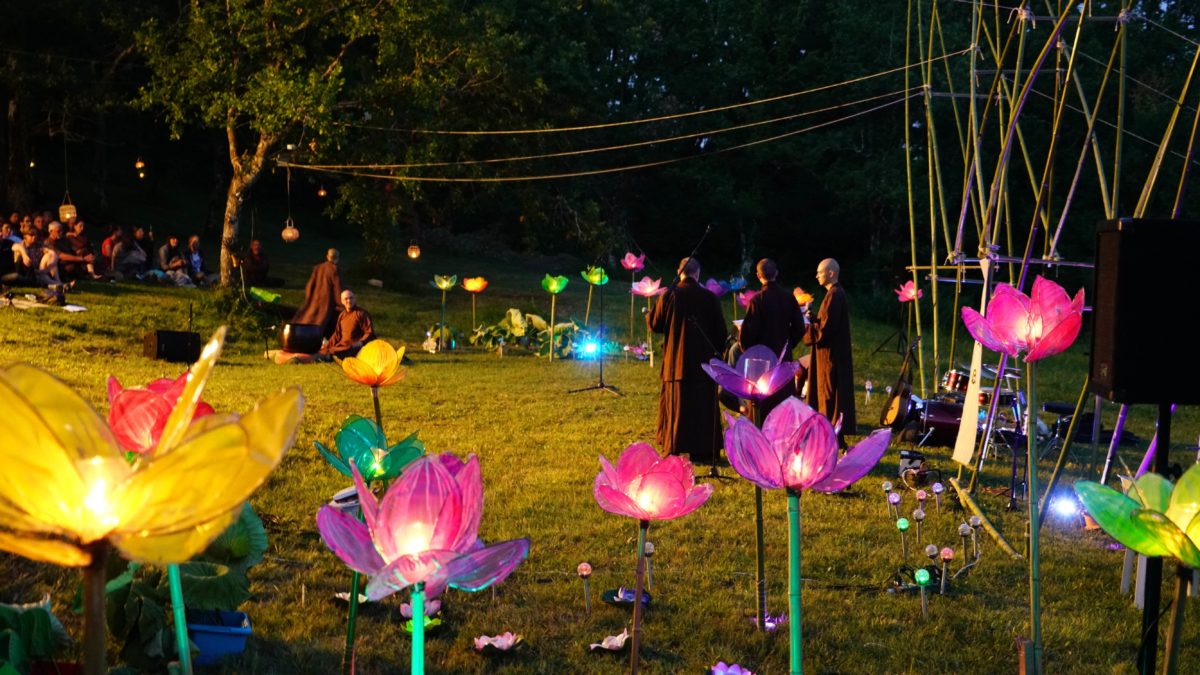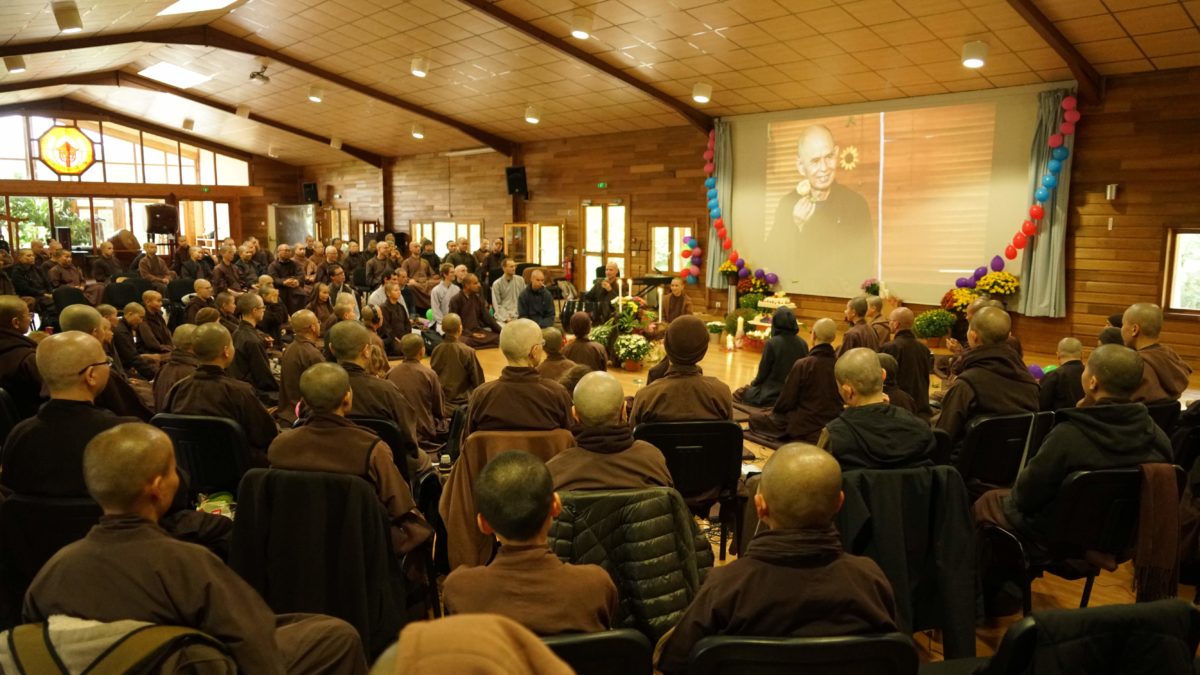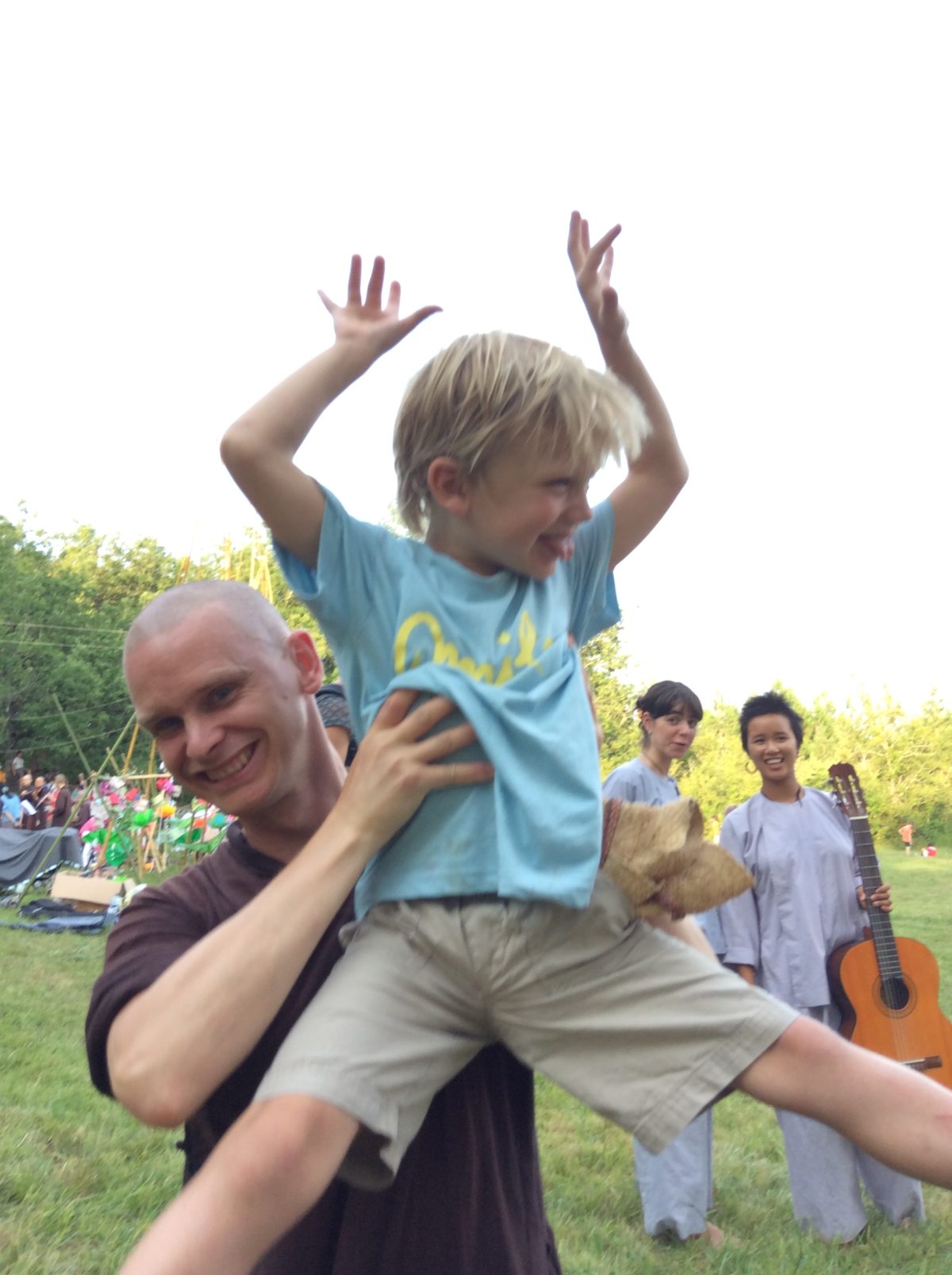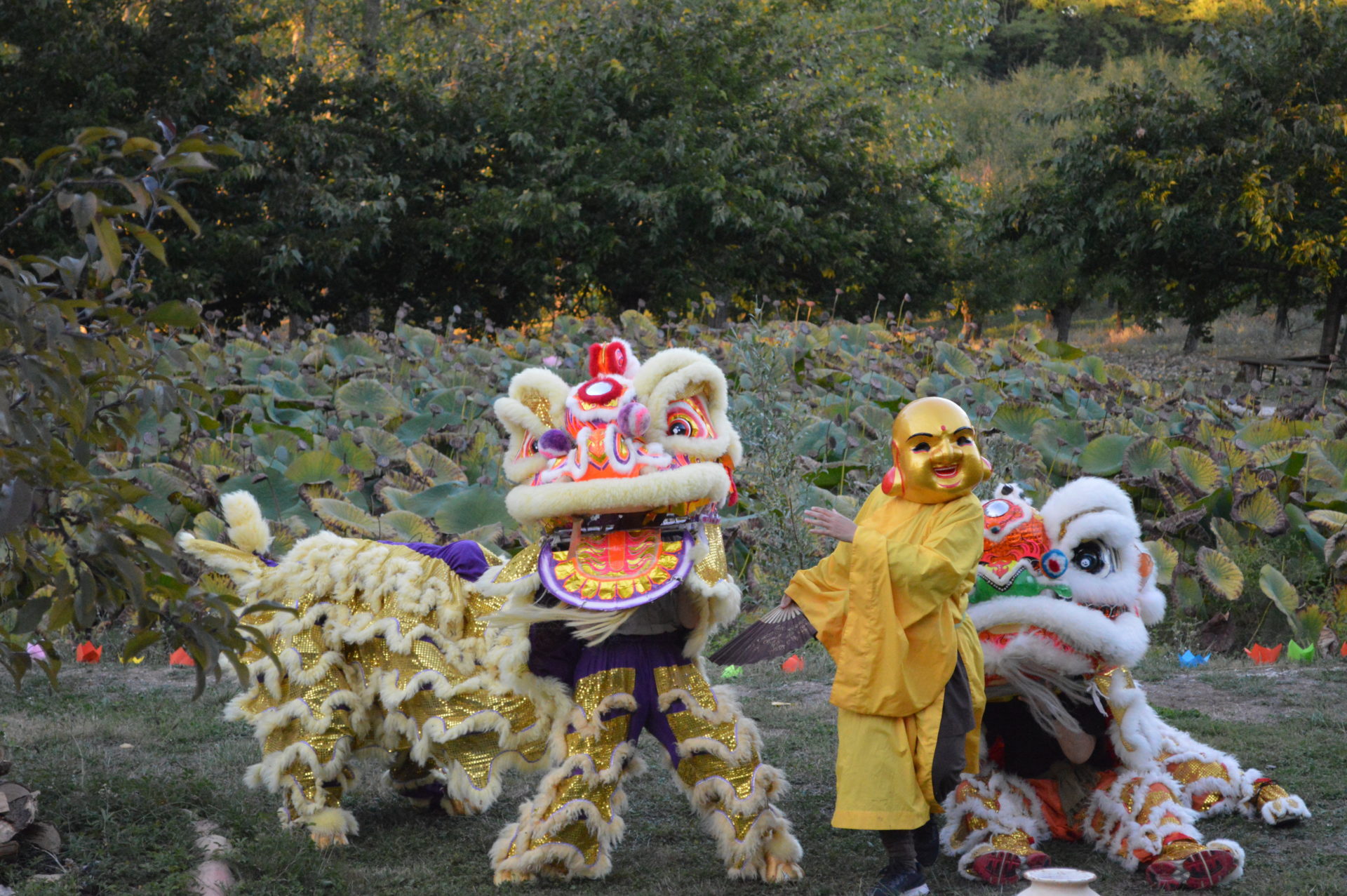A Lot of Suffering
By Brother Pham Hanh

As I sat in front of my tent and the sun was slowly rising, I looked at a spider web reflecting the sunshine. The spider had caught a little insect and spun a little cocoon.
A Lot of Suffering
By Brother Pham Hanh

As I sat in front of my tent and the sun was slowly rising, I looked at a spider web reflecting the sunshine. The spider had caught a little insect and spun a little cocoon. I was drinking my tea and enjoying the moment—part of me was enjoying the moment; my restless mind had also started to compose an article. So please enjoy the tea, sunshine, spider web, mindfulness, and restlessness.
I remembered talking with my dear elder Sister Dieu Nghiem (Sister Jina) one day in the Upper Hamlet. As a young monk living in the community, it’s often a challenge not to get irritated with the Sangha. I shared about a difficulty I don’t remember. Perhaps it was something the Sangha (“they”) had done, like not cleaning this, or throwing away that, or not taking care of some other thing. It’s funny; when we talk about “the Sangha” it’s always about “they,” meaning those people who aren’t me. She looked at me with compassion and said, “Ah, yes, ‘woulda coulda shoulda’—a lot of suffering.” What she said further, I don’t remember, but that sentence stuck and has become a koan for me, as well as a bell of mindfulness.
How much time in my life have I spent stuck on how I want things to be, or thinking how things could have been, if only this or that had happened, and if people would have listened to me. Or how things should be if people would just think. I know I’m right, why don’t they just see it!
A few days ago, I went into the kitchen and saw a new mixer. The mixer we had bought some years ago was broken now, so it was replaced. Instead of appreciating the brothers for taking care of the kitchen, I became irritated. Only a few weeks previously, I had told another brother we needed a new mixer; the old one wasn’t strong enough, was made for a small kitchen, and could easily break. We cook for a lot of people and we needed more professional material, so I found the perfect machine. That information hadn’t been passed to the kitchen coordinator, so I went to him to say to take the new machine back. I also sent him a strong email, explaining why and how to order a new one.

As the day progressed, I suddenly realized I was caught in my idea, and I was suffering. I remembered Brother Phap Dung’s agreement with Brother Phap Do: if either of them were ever caught in their ideas in a meeting, they’d make a sign. They’d hook their front teeth with their thumb like a hook on a fish, and whenever the other saw that sign, he wasn’t allowed to speak anymore in the meeting. He shared with me how frustrating that was (“But I am right!”), yet it had helped him a great deal.
I looked into myself. Yes, I was caught. Yes, I was suffering, and I had made the other brothers suffer. I recognized the tension in my belly, and I felt more restricted. So I let go of my idea, and relief came immediately. I went to the brother and apologized for my intense energy towards him. I realized my idea might be right, but maybe his idea might also be right. I couldn’t help myself though; I still had to suggest an alternative solution. Habit energies are strong.
I was definitely caught in a “woulda coulda shoulda.” When examining this, I see the “woulda coulda shoulda” is always about resisting what is. We can spend so much time resisting what is. We forget what is simply is, and we can’t change it any longer. Whatever has happened gave rise to what now exists. The tea and the spider gave rise to this text. Without the tea and the spider, what is now would have been different. This is, because that is. That is, because this is. This concept describes reality, and we still resist. Why do we do that?
When looking into suffering, it’s difficult not to become a victim: “They” are doing this to me. I’m not respected. I’m not understood. But this situation happened because I was in it. What did I bring into this situation? I explored the conditions. With my mixer as an example, I brought in:
- The joy of wanting to make vegan cheese and the frustration of not having a mixer that’s strong enough and goes fast enough.
- The irritation that the mixer broke because it’s made of plastic, and we had a leaking bowl for years.
- The strategy of wanting a professional kitchen because a professional kitchen would better address the needs of the Sangha. When the needs of the Sangha are met, I feel I’m taken care of. And I want to feel taken care of because I’m afraid I’m not worthy to be taken care of.
- The frustration from all the times I felt I wasn’t being taken care of in the Sangha.
- The idea that I’m the older brother and as such, I can talk to the kitchen coordinator strongly. This use of power gives me the sense of being more important than him. If I’m more important than him, then I’m worthier than him.
- My strong ability to think things through, which I inherited from my parents, my upbringing, and my culture. When I believe I know better than someone else, then I’m better than someone else.
However, there is a catch, and we must be careful. When recognizing unwholesome conditions, the habit of thinking in black and white can become strong. We might think, “I have this motivation that is unwholesome” and reject the whole motivation (and maybe ourselves as well). Simply because something has some unwholesome elements, it doesn’t mean the whole motivation should be discarded; there are also wholesome elements. We must try not to make the unwholesome aspects bigger than they actually are, while continuing to remember we bring ourselves and these motivations into each situation.
I have the fear of not being good enough, which tells me I have no right to exist and touches my fear of death and my desire to live. This fear manifest itself in many forms, but it cannot be solved by external conditions. It’s only when I hold my fear tenderly in my mindful embrace that the fear can calm down. I know I’m responsible for this, and nobody can do it for me. In my experience, feeling that I’m recognized and being taken care of by others helps lessen my fear, but taking care of myself brings the relief I want.
I find there is freedom in recognizing the conditions I’ve brought into difficult situations, for there’s something I can do about them. I have experience taking care of my own conditioning, so I know I’ll able to handle these feelings when they arise. I can solve this part of the difficulty and not become a victim. Understanding how a situation arises helps me to get in touch with my underlying feelings and then practice with those feelings.
I have practiced with the feeling of not being “good enough” often. It has given me much freedom. I find it manifesting itself in many forms and continue to discover new forms. The seed itself has grown much smaller over the years, and I feel much better. I can better see how it manifests and take care of it as an old friend. I don’t resist it any longer, but I’m happy to find it when it’s there. I know my freedom is made from it. It helps me to let go of my ideas because I now have the experience—not knowledge or thinking—that ideas aren’t the solution to my fear. The solution lies in embracing the feeling which the ideas are based on.
I’m far from a perfect practitioner. I still have restlessness when a perfect moment of mindfulness—with sunshine, spiders, and tea—presents itself. But I know that’s me, and I’m like this because of everything that has happened to me in the past. If other things had happened to me instead, or if I had done things differently, I’d be another person today, and I could have been a better practitioner. But I’m not. I’m what I am, and that’s okay. I can still do better. Just recognizing the restlessness and being with it is already changing me. Maybe next time I’ll decide not to engage with it, and you’ll not have another article.
My practice of “woulda coulda shoulda” helps me to get in touch with my resistance. It helps me to take care of my underlying feeling and my strategies. It also helps to bring me back to the present moment and more understanding. Just by being aware I could have done things differently waters that seed. I know next time when things happen, this understanding will also be part of me, and I can do things differently. But for now, it is what it is.
REPRINTED WITH PERMISSION FROM WKUP.ORG

Pham Hanh is a Dutch monk who completed the five-year monastic program and is enjoying his second five-year monastic program. Besides being an inventor and finding new ways to make vegan foods like tempeh, cheese and black garlic, he’s actively involved in too many things.

